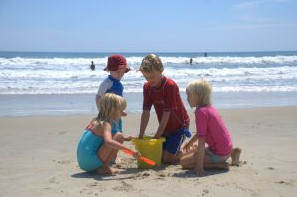
Many beaches can causes infectious disease if they aren’t clean enough.
A factor inspiring many families moving abroad is the promise of great weather and an outdoor lifestyle. This is especially true of the many British families who move to Spain, Australia and Thailand. Recent research however, has shown that dangerous microbes inhabit the sand on many beaches.
The study, published in Environmental Science & Technology, found common sources of bacteria were cats, dogs and birds. Some of these microorganisms can cause gastrointestinal illnesses.
The researchers have developed a guideline system to allow authorities to assess the risk of a particular beach. The type of bacteria that thrive depend on the environment, so there are differences in the variety of bacteria in the sea compared to the sand, for example.
Tomoyuki Shibata, first author and assistant professor at Northern Illinois University stated, “Parents of young children don’t need to overreact to our findings and they can reduce their child’s infectious risk by basic hygiene practices such as hand washing before eating or drinking and taking a shower.”
The United States Environmental Protection Agency recommends people avoid putting their head under the water when wading or swimming to avoid coming into contact with infectious diseases.
Parents can find information regarding beaches in their area online. The Blue Flag scheme is a voluntary programme that rates beaches on water quality, safety, services and environment. It is used in 46 countries across the world.
In the EU there are strict regulations to monitor water quality on beaches, lakes and rivers. In 2011 92% of beaches and 90% of rivers and lakes met the minimum EU standards. Beaches in Cyprus, Croatia and Malta have all scored highly in the past.